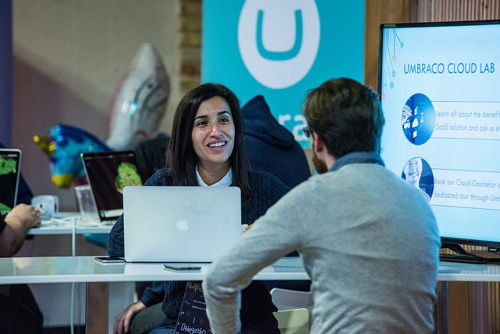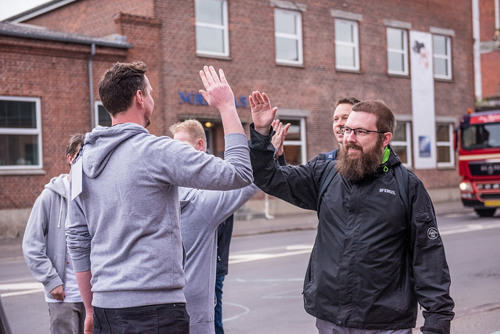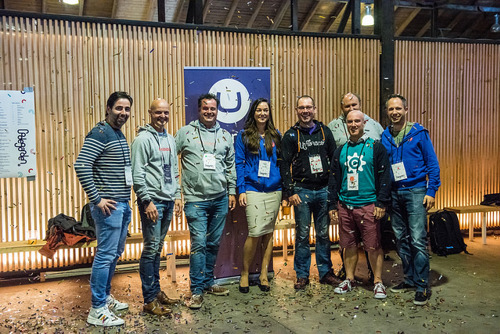In this blog post I would like to share the focus areas that I am using as a compass in this new role of mine. Focus areas that’ll also make it a bit clearer what I’ll actually be able to help you - the community - with.
The Umbraco community is rich with its history, members’ relationships, and nuanced workings, and I believe that these complex aspects cannot be instantly covered or easily understood. So, my work is still at the exploration phase, as I am getting to know everyone and everything (quite ambitious to put it like that 😅 - but why not!)
The 5 focus areas:
1. Responsiveness: The importance of us giving you (timely) feedback

No one likes to be left hanging.
And if you’ve contributed with a pull-request we definitely don’t want to leave you hanging!
As in all open source software communities, receiving a timely feedback for a contribution is highly valued, and it shapes the contributor’s perception of Umbraco and their future contributions to the project.
As many have indicated in their responses to the survey on the structure of the Umbraco community and its relationship to HQ, the pull requests submitted to the Umbraco CMS project have sometimes been neglected or ended up staying open even after long exchanges between the core team and the contributor. And that’s frustrating. We know we can do better here, and we will.
2. Tribal knowledge: We can sometimes get trapped in our own bubble 🎈
Do you know where we are going with Umbraco?
The Umbraco core team has a strategy they’re following in regard to the development of Umbraco. We admit, at times, the core Umbraco team assumes that the entire community is in on this plan and understands why we’re focusing on specific things rather than others. The same team may sometimes think that the process of contribution is clear and easy to follow and that the expected steps are presented in words everyone understands and can easily apply.
But that’s not always the case.
It is important to minimize the effect of this tribal (or internal/silo) knowledge. We do this by making sure that the core team and the community share the same concepts and understanding. One of the ways to do this will be to be more open in our communication about the contribution process. We will also be sharing metrics on the Umbraco community, such as the distribution of contribution between Umbraco HQ and the community members, the activity of the forum on Our, the Umbraco meetups’ activity etc.
This will hopefully give everyone a better understanding of where we’re going and why as well as how best to contribute (which we love you to do!).
3. Fear of rejection: The apprehension of submitting that first pull request or forum post
Remember the knot in your stomach when you were about to submit your first pull-request? The fear of asking a “silly” question on Our?

The Umbraco community is first of all a group of people.
A group where the human nature plays a role that shapes how future contributions are made. To contribute is not always the easiest when a name is attached to the contribution and a rejected pull-request might sometimes be personally seen as a failure - this goes for newcomers as well as more seasoned Umbracians.
In the case of Umbraco, even the word ‘friendliest’ does not always help contributors feel welcomed and not judged. Here again, and as mentioned earlier, the importance of being open and giving a timely and reasoned feedback plays a significant role in reducing this fear. And by reducing the fear we’re automatically encouraging more people to contribute - because they’ll feel more appreciated, valued and heard - even if we’re talking about a “rejection”.
We already have the friendliest community, but we hope to see this behaviour echo even more throughout the community.
4. Rewards and recognition: High-fives where high-fives are due (H5YR!)

Of all the research papers on communities that I’ve read, I don’t think there was one that didn’t mention, in a one way or another, the importance of recognition. I’m starting to think that they are on to something 😉
But seriously, this should be a no-brainer.
Beyond responsiveness which would be expected by most of the community members who take of their time to contribute, we would like to show our appreciation by recognizing the efforts made by everyone. This goes both for the highest contributors as well as the beginners who have overcome the fear of rejection and who managed to submit their first pull-request. But also the ones who provide help to someone in the forum, or have their first talk in an Umbraco meetup/festival.
A reward system can help the community members thrive and create a stronger community. It can showcase their skills and strengths and it will not only help many advance in their careers but will also help the community members manage their expectations and get to know each other better.
As a recent example of where we’ve already made sure to “give high-fives” is by bringing back uProfiles as a way to acknowledge the various levels of active community members.
5. Sustainability: Keeping the interest in Umbraco alive for centuries to come!
What is it that we are trying to achieve after all?

To maintain a strong community.
And that requires a lot of effort. Sustainability is not only a matter of onboarding new community members but has a lot to do with maintaining the interest of the current ones.
Mentoring and providing help to newcomers as well as keeping the dialogue going with existing members will help the Umbraco community grow and stay sustainable. This includes, for example, making sure the quality of the documentation is good and up-to-date - which Sofie is already working on.
As mentioned, these 5 focus areas are just the start for me. In some areas we already have initiatives in place or planned while we need more in others. I’m still in the research stage of many of them to find out what initiatives we can introduce and support in order to grow as well as keep the Umbraco community strong.
I am counting on the friendliness of the Umbraco community and your eagerness to contribute and play an active role, and I hope that, together, we will be able to build a strong case of an even higher engaged and collaborative open source software community ❤️ Well, of course we can!
#H5YR!,
- Ilham :)






